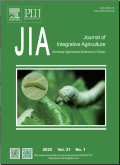首页|期刊导航|Journal of Integrative Agriculture|Pectin methylesterase inhibitors GhPMEI53 and AtPMEI19 improve seed germination by modulating cell wall plasticity in cotton and Arabidopsis
Pectin methylesterase inhibitors GhPMEI53 and AtPMEI19 improve seed germination by modulating cell wall plasticity in cotton and Arabidopsis
Yayue Pei Yakong Wang Zhenzhen Wei Ji Liu Yonghui Li Shuya Ma Ye Wang Fuguang Li Jun Peng Zhi Wang
Journal of Integrative Agriculture2024,Vol.23Issue(10):P.3487-3505,19.
Journal of Integrative Agriculture2024,Vol.23Issue(10):P.3487-3505,19.DOI:10.1016/j.jia.2024.03.036
Pectin methylesterase inhibitors GhPMEI53 and AtPMEI19 improve seed germination by modulating cell wall plasticity in cotton and Arabidopsis
摘要
关键词
cotton/seed germination/cell wall/pectin demethylesterification/PMEI/ABA分类
农业科技引用本文复制引用
Yayue Pei,Yakong Wang,Zhenzhen Wei,Ji Liu,Yonghui Li,Shuya Ma,Ye Wang,Fuguang Li,Jun Peng,Zhi Wang..Pectin methylesterase inhibitors GhPMEI53 and AtPMEI19 improve seed germination by modulating cell wall plasticity in cotton and Arabidopsis[J].Journal of Integrative Agriculture,2024,23(10):P.3487-3505,19.基金项目
funded by the National Natural Science Foundation of China(32072022) (32072022)
the Nanfan Special Project,CAAS(YBXM07) (YBXM07)
the Hainan Yazhou Bay Seed Laboratory,China(B23CJ0208)。 (B23CJ0208)

